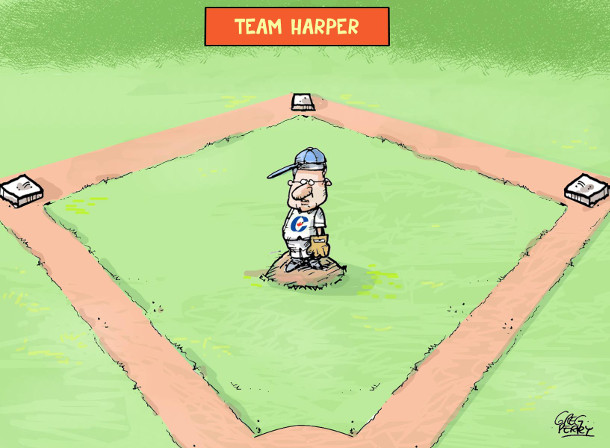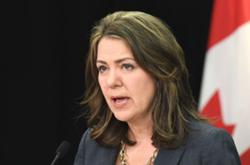If the current federal election isn't long enough for you, take heart: Oct. 19 might merely signal the end of Part One of the epic 2015 campaign.
As Mike Duffy might put it: But wait -- there's more.
As things now stand, not one of the major parties is poised to form a majority government. It's assumed that if the Conservatives can hold on to a minority, Harper will continue to be prime minister. We may want to re-think that assumption.
It's true that Harper, by constitutional convention, would have first shot at forming a government if the Conservatives win the largest number of seats. But there's a hurdle Harper has to leap first: he has to win a vote of confidence in the House of Commons.
Try as I might, I can't imagine how that would happen.
New Democrats are, obviously, unlikely to vote with Harper, after spending 11 weeks -- no, make that four years -- calling themselves the only viable alternative to the Conservatives and seeing a real shot for themselves at forming government.
What about the Liberals? Once upon a time, Liberals liked to talk about a two-election strategy -- making enough gains in this election to keep the Conservatives to a shaky minority, letting them govern for a year or so until Justin Trudeau was "ready" (pardon the ad word) to win.
But that was before Liberals started a downward slide in the polls -- right around the same time the party decided to support the controversial and sweeping security bill known as C-51. Liberals have been taking a lot of grief from supporters and would-be supporters for backing C-51. It's not clear to me how Trudeau could make another case to prop up the Conservatives in any confidence vote in the Commons.
More to the point, why would Trudeau and his party run to the aid of a party that has demonized and ridiculed them in a withering barrage of ads for the past two years? Out of pride alone, it would seem that neither Trudeau nor his Liberals would be inclined to play nice with a prime minister bent on the destruction of their party.
Odder bedfellows
So that leaves the smaller parties in the Commons.
If the Greens pick up a few more seats in this election, they could be a partner for the Conservatives. But Harper would be unwise to count upon support from that quarter, given his environmental track record and his seeming reluctance to take Green Party leader Elizabeth May seriously. In addition to her passion for all things green, May has also spent the past few years speaking out ardently against Harper's offences against democracy. It's hard to imagine her making a deal to keep him in power for power's sake.
The Bloc Quebecois could bounce back to Parliament with some crucial seats, but then Harper would have to explain to his Conservative base why he's the one forming "a coalition with separatists" -- which is how the Conservatives famously denounced the 2008 Liberal-NDP-Bloc deal that almost drove Harper from power. Whatever the Bloc would demand in return for taking part in such a minority government likely would be too much for Harper to contemplate, at any rate.
The extra-long campaign was clearly designed to drain the bank accounts of the opposition parties, making them reluctant to kick off another campaign immediately after this one. But that reality also could create a powerful incentive for them to work together -- to deny Harper a confidence vote and make the case to the Governor General for a coalition or an accord instead of another election.
Remember: Harper himself argued for such an arrangement in a letter to the GG after the 2004 vote.
Lonely at the top
Since then, though, Harper has spent a lot of time cultivating a lonely-at-the-top image for himself. He's the guy working alone at his desk, who turns out the light himself at night. Judging from his answers about the ongoing Mike Duffy trial, Harper was standing somewhere in that office -- totally in the dark -- while his staffers were emailing back and forth about the payout to the embattled senator.
Still, for all the trouble the Duffy trial is causing him, no one is going to accuse Harper of having too many friends in power. He's shed communications directors and chiefs of staff almost as often as his predecessor, Paul Martin, switched priorities for his government. Harper went into this election minus a good portion of his old front bench -- John Baird, Peter MacKay, James Moore, the late Jim Flaherty, not to mention long-time allies such as retiring Edmonton MP James Rajotte.
Even his campaign events look a bit lonely. Sure, he has his family with him -- but only a sparse contingent of reporters on the campaign plane and small audiences that are all closely vetted by party staffers and were (until recently) under a gag order preventing them from sharing images or descriptions of Harper's appearances.
Paul Wells titled his book on Harper: The Longer I'm Prime Minister. He might have subtitled it: The Lonelier I Get.
True, it might not be a good idea for prime ministers to have too many friends. It's now conventional wisdom in Canada that PMs are undone by their friends, not their enemies. The proof is on display in an Ottawa courtroom this month.
But if Harper has his modest sights set on eking out a minority win on Oct. 19, he's going to need friends on Oct. 20 -- or at least people who will work with him long enough to get a confidence vote passed in the Commons. At the moment, it's hard to see where he might find them.
And that means either another election, right after this one, or a government formed by a combination of Harper's rivals, working together. If that happens, Harper will find it really lonely at the top. ![]()
Read more: Politics, Election 2015















Tyee Commenting Guidelines
Comments that violate guidelines risk being deleted, and violations may result in a temporary or permanent user ban. Maintain the spirit of good conversation to stay in the discussion.
*Please note The Tyee is not a forum for spreading misinformation about COVID-19, denying its existence or minimizing its risk to public health.
Do:
Do not: